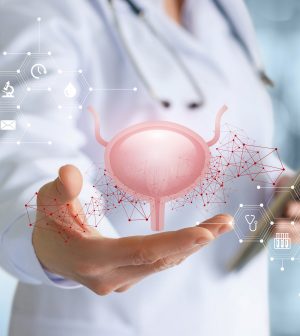- Could Your Grocery Store Meat Be Causing Recurring UTIs?
- Are You Making This Expensive Thermostat Error This Winter?
- Recognizing the Signs of Hypothyroidism
- 10 Strategies to Overcome Insomnia
- Could Artificial Sweeteners Be Aging the Brain Faster?
- Techniques for Soothing Your Nervous System
- Does the Water in Your House Smell Funny? Here’s Why
- Can a Daily Dose of Apple Cider Vinegar Actually Aid Weight Loss?
- 6 Health Beverages That Can Actually Spike Your Blood Sugar
- Treatment Options for Social Anxiety Disorder
New Insights Into the Persistent Pain of UTIs

People with recurring urinary tract infections frequently have persistent pain, even after antibiotics have cleared the harmful bacteria from their system.
Now, researchers have figured out why this perplexing problem occurs.
It appears that an overgrowth of highly sensitive nerve cells can occur in the bladder as a result of frequent UTIs, researchers report March 1 in the journal Science Immunology.
“Typically, during every bout of UTI, epithelial cells [lining the bladder] laden with bacteria are sloughed off, and significant destruction of nearby nerve tissue occurs,” explained lead researcher Byron Hayes, a former postdoctoral fellow in pathology with Duke University.
“These events trigger a rapid repair program in the damaged bladder involving massive regrowth of destroyed nerve cells,” increasing a patient’s sensitivity to pain, he added in a university news release.
UTIs account for almost 25% of infections in women, said senior study author Soman Abraham, a professor of pathology at Duke.
“Many are recurrent UTIs, with patients frequently complaining of chronic pelvic pain and urinary frequency, even after a round of antibiotics,” Abraham said. “Our study, for the first time, describes an underlying cause and identifies a potential new treatment strategy.”
Comparing bladder biopsies from people with and without recurring UTIs, researchers found evidence that sensory nerves had become highly activated in the UTI patients — explaining their persistent sense of pain.
Mouse studies then revealed that unique conditions in the bladder that result from regular UTIs can prompt activated nerves to grow with each infection.
The cycle of nerve cell destruction and regrowth is driven by the patient’s immune system, the researchers said.
In particular, immune cells that fight infection and allergens called “mast cells” release chemicals called nerve growth factor, which drive overgrowth and increase sensitivity of nerves.
As a result, patients experience more pain and a greater need to relieve themselves frequently, the researchers said.
By treating mice with drugs that suppress nerve growth factor, researchers were able to quell those symptoms.
“This work helps illuminate a puzzling clinical condition that drives medical costs and affects the quality of life of millions of people, primarily women,” Abraham said. “Understanding the crosstalk between mast cells and nerves is an essential step toward effective treatments for people suffering repeat urinary tract infections.”
More information
The Cleveland Clinic has more about urinary tract infections.
SOURCE: Duke University, news release, March 1, 2024
Source: HealthDay
Copyright © 2026 HealthDay. All rights reserved.










